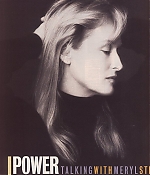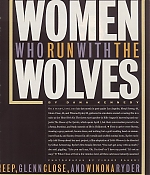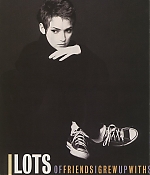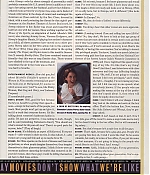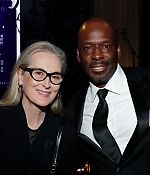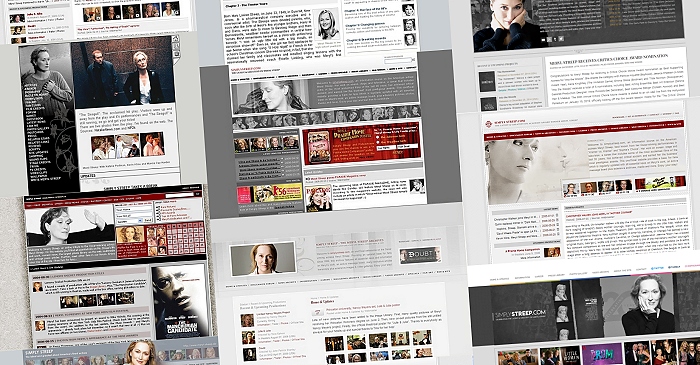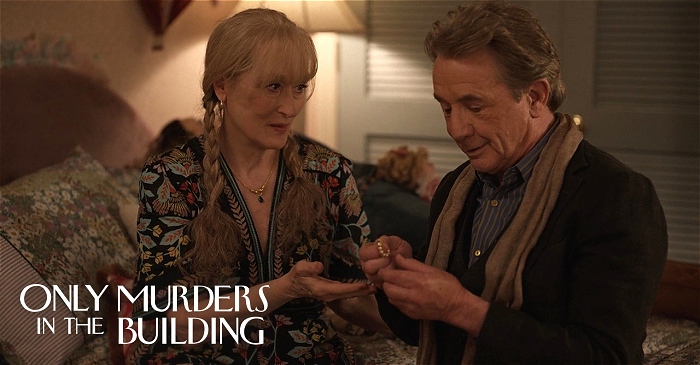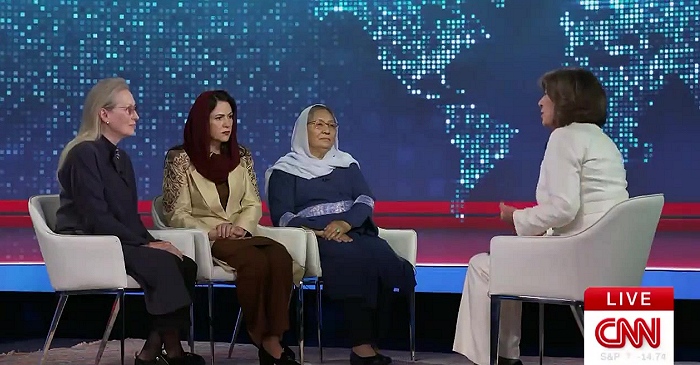
|
Women Who Run With Wolves
Entertainment Weekly ·
February 11, 1994
· Written by Dana Kennedy
|
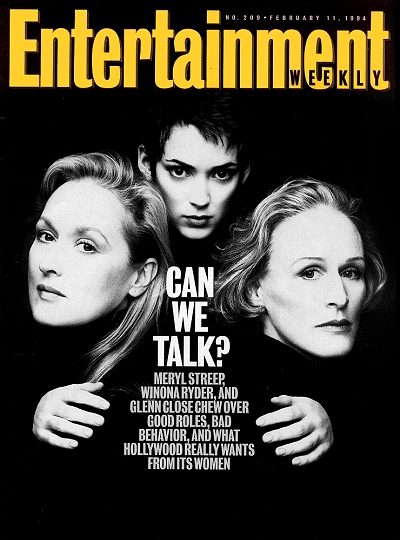
First to arrive were Streep, wearing a gray pantsuit, brown shoes, and nothing but a gold wedding band on unmanicured hands, and Ryder, dressed in old overalls and scuffed combat boots. Ryder excitedly told Streep about her next project, a film adaptation of Little Women to be directed by Gillian Armstrong, Ryder’s first female director. ”You can’t get away with as much,” she said, giggling. ”Like you can’t say, ‘Oh, I’m tired’ or ‘I have my period.’ It’s not as easy.” When Close arrived a few minutes later, all three actresses instantly assumedroles. Streep-who by sheer strength of personality could probably command the U.S. armed forces in addition to tending to her acting career, her husband, and her four children-ordered room service for everyone (tea, soup, and a basket of breads with butter in the shape of swans) and rearranged the furniture so Close could sit by the fire. Close, dressed in black, with a scarf protecting her throat for that night’s performance at the Shubert Theatre of Sunset Boulevard, let Streep minister to her. Ryder was sweet and respectful but held her own with her costars. Since working together on The House of the Spirits, an adaptation of Isabel Allende’s 1985 novel, also starring Jeremy Irons, Vanessa Redgrave, and Streep’s daughter Mamie, 10 (playing her mother’s character as a child), all three actresses have moved on to other projects: Streep takes on her first action role in this summer’s The River Wild, Close plays a tabloid editor in the spring comedy The Paper, and Ryder stars in this month’s Generation X comedy Reality Bites. The three remained warm and friendly-but this was no cozy fireside chat. These women have climbed to the top of the mountain, and sometimes the air in the room was so thin it was hard to breathe.
Entertainment Weekly: How did you feel about Michelle Pfeiffer’s speech at the Women in Film awards ceremony last year? She took aim at Hollywood for movies in which women were ”sold” to men, like Pretty Woman, Mad Dog and Glory, and Indecent Proposal.
(Uncomfortable pause.)
Meryl Streep: Well, good for her, because there’s no benefit to giving that speech-none-except in the hearts of the people you reach. Most people won’t get up and give it, but it’s a truth that everyone knows. It’s like talking about someone’s bathroom habits in public. It’s just not attractive. I was talking to Jack, though, and he said (mimicking Nicholson’s drawl), ”You should see what’s around for 60-year-old men! There’s no good parts for anyone, babe!” (They all laugh.)
Glenn Close: It’s definitely an aspect of Hollywood. Everyone wants f – -able women in their movies. In this culture, f – -able women are young and thin and up to maybe 34 or 35.
Streep: But films operate on the level of dreams and fears and projections, so when people imagine themselves, they imagine themselves in their glamorous prime. I think if there were an enormous audience clamoring for stories that centered on 50-year-old women, then these guys would be killing themselves out here to find those scripts.
Close: It’s so ironic, because I feel more glamorous and sexual than I’ve ever felt in my entire life. I don’t know about you. (She laughs a little nervously and looks over at Streep.) Well, it’s so silly here, but in Europe, isn’t it different? (She looks again at Streep.)
Streep: In Europe? No.
Close: Oh, they do think of (older) women differently.
Streep: No.
Close: You always hear that older women are more appreciated and-
Streep: (Leaning toward Close and rolling her eyes) Hello? Hello? No, they don’t. We have to look at that age group of women that are most desirable in certain men’s eyes and find out if they have parts available to them as plentiful as male protagonists-or if we’re screwed on every level. Here’s the difficulty of having this conversation: You’re talking to incredibly privileged people. You know, I made one speech (about actresses being paid less than actors, at the first National Conference of the Screen Actors Guild’s Women’s Committee in 1990), and I have regretted this speech every day of my life. It’s like that’s my thing! Gawd! And then I read interviews with other actresses and they say (affecting haughty tone), ”Oh, well, I’m not going to complain because I feel very privileged,” and I think, oh, right (laughs). I’m not raising any banner. All I did was say in one speech what everybody knows. If the people who are making this money at the top of the profession don’t speak about it, then when will there be equity down the line?
Close: I don’t think it will ever change. I think they look at the dollars and cents at the box office. That’s the bottom line. Now, women like Julia Roberts and Whoopi, they’re getting valued.
Streep: It isn’t based on that. It isn’t. Now I love (she goes off the record to name a major male movie star), but he doesn’t bring in the box office. But he will command a big salary
Close: But that’s because he’s a male icon to all the guys.
Streep: That’s right, because he’s a guy, guy, guy. People who are paying him feel, oh, I wish I were like that! So he seems valuable, but really, in terms of box office, if you put his name on that marquee, it’s not going to bring in the people who watch Beavis and Butt-head. Am I wrong?
Winona Ryder: Ahhh, I think you’re right. For my generation, I know that no one knows who he is.
EW: Winona, we’re talking about your generation. You’re supposedly in this f –able group-
Close: (Pointing at Winona’s overalls and combat boots) Not in that outfit. (Everyone laughs.)
EW: Does your generation of actresses resent the kind of roles that are available?
Ryder: I don’t know what’s going out to the other actresses who can’t pick and choose, like I can. But I have a lot of friends in college who I grew up with back in Petaluma (Calif.) who say movies don’t show what we’re like. Certainly a lot of them are offended by that “f–able woman” image, and these aren’t critics or intellectuals. These are regular kids who just go to the movies every other weekend.
EW: What advice would you two give Winona? What pearls of wisdom from your own careers?
(Streep and Close are silent.)
Ryder: Come on, toss me a bone.
Streep: There’s nothing I haven’t beaten into her over three months of shooting. She’s doing absolutely the right thing.
Close: Fads will come and go and people will be hot and cold, but the thing you have to fight for tenaciously is to choose things for very personal reasons. That will be the sum of your career, not because you think something will make a lot of money or somebody thinks it’ll be good for you.
Ryder: The credit that I give myself is being able to avoid strategic thinking. I remember when I got an agent at Triad. They started sending me scripts. They would say we want you to go up for this, and I’d say “No, it’s not good” and they’d say, “You can’t not go up for something-you just can’t, you haven’t done anything, you’re 12 years old.” Luckily my parents were, “You don’t have to do it, it’s lame,” but I have always been like that.
Streep: I have a story to tell. I made a movie which I think is going to be wonderful, The River Wild. They’re putting a trailer into the theaters at Christmastime. I say, “Great.” They say, “We really want you to see it, because we want your input.” I say, “Great.” So I saw the trailer and it was wonderful. The only thing is, the only time you recognize me is this big close-up when I’m pointing a gun at the camera. Now, I hold a gun for 20 seconds of a 120-minute movie, and I don’t want that to really represent the movie. It flashes on the screen and I’m going “Nooo!” but it’s a huge close-up and I have a revolver. I said, “I really want you to take that out. Find some other shot of me in extremity. I know you have reams and reams of film. Because, frankly, I don’t want my Christmas gift to America to be me pointing a gun when the President was in my agent’s office two days before saying, ‘People, you have to work on this (depictions of violence) yourselves. Otherwise the next step is the big guy coming in and McCarthyism and everything else.'” Then they came back and said, “We can’t find any other piece of film”-in the 9,000 feet of film of me, I’m in every frame of this movie-“that has you in such an effective way.” I said, “I just don’t believe that.” They said, “Well, they want to have a meeting with you to tell you why that is.” I said, “Great! I’d love to take that meeting.” And the next day they put the trailer on Entertainment Tonight at 7 p.m. in more millions of households than will ever go see the movie. There it was before I ever had the meeting to plead my case. And I hit the f–ing roof. You know why? Because that shot of me is somebody’s idea of sexy. Or something.
EW: Did you raise hell with someone after that?
Streep: No. What was I gonna do?
Ryder: Oh, they probably would say it shows a woman being strong!
Streep: I’m strong in this movie, honey, I am strong in this movie. I killed myself to get strong. I really risk my life over and over in this thing and I know they have me screaming “Nooo!” without a gun, because I was screaming “Nooo!” for five months. But the one time I’m screaming “Nooo!” with a gun, they had to use that in a big close-up.
Close: Did you ever have a meeting?
Streep: No, I’ve never had a meeting. I got a letter saying, “I hope you understand that this trailer has tested off the top of the charts with a group of people that you don’t normally appeal to, which is 18-to-25-year-old men.” That was supposed to convince me that that was a good reason, and I said, “That’s a good reason that they shouldn’t have the shot-if it appeals to that part of the population.” (Laughs.)
EW: Since the take on you, Meryl, is that doing films like The River Wild is part of your strategy to change your career and be more commercial, I’d almost think you’d welcome the approval of that age group.
Streep: Anybody who says they strategically plan their career is giving you a load, because there’s no way to do that. What’s presented to you in any given career you have no control over, unless you’re the head of the studio and you’re commissioning scripts, or you have your own production company. My strategy has to do with coming home at night and being with my children. (Streep and her husband, sculptor Donald Gummer, have four children: Henry, 13, Mamie, Grace, 7, and Louisa, 2.)
EW: Glenn, do you plot your career? To what lengths to you go to get your roles? You’ve really created a buzz with Sunset Boulevard.
Streep: That’s the part of a lifetime. You’d eat somebody’s laundry for a year to get that part.
Close: Well, I had to test for Fatal Attraction. Nobody thought I could be sexy. But I’ve learned if they don’t want you, they don’t want you. There’s very little you can do to change their minds. A lot of people can’t imagine you beyond what your initial image is. My first role (in 1982’s The World According to Garp) was Jenny, this asexual nurse in white. People can’t imagine you as anything else. My part in The Big Chill was kind of like the daughter of Jenny, and The Natural was kind of like the sister of the woman in The Big Chill. And then the woman in Fatal Attraction came and all that was blown to hell, thank goodness. You know you start out in this profession so hungry and so idealistic, and you fight and fight and you write letters and you try to get second auditions, and it comes to a point where it’s obvious that it’s a little out of your control.
EW: Do you worry about getting good parts as you get into your 50s, or even now?
Streep: I don’t worry about it. I worry about too many other things.
Close: No, because we are privileged, and I’m also working my ass off now. There’s also so many other things I’m interested in right now.
Ryder: Well, I’m worried. (Much laughter.)
Close: I’m at a time now where it has to be damn good and it has to be a great & group of people. It’s something that’s all-consuming, and you know what it’s going to cost emotionally and physically in uprooting your life. I have a child (Annie, 5, fathered by producer John Starke). People are dependent on me. The stakes are higher for me.
Streep: I hope there are more opportunities (for actresses), not for me but my girls. I want them to see not just examples of beautiful young women, I want them to see that women are beautiful throughout their lives and important and formidable and exciting, because I think those fantasies are what you build your dreams on. I know I did when I was a kid.
EW: Why did you choose to do The House of the Spirits?
Close: I think it’s an extraordinary story and has a very profound message. I have no idea how it will turn out. It’s not the usual fare.
Ryder: I was going through a really strange time in my life during this movie. In a weird way, it was therapeutic. There were times when I wasn’t sure if I could make it through. I remember one day I was in makeup looking at the bruises, and I realized because of the rough year I’d had that seeing myself that way was how I felt inside. I had dealt with a couple of deaths right before the movie happened.
Streep: (The movie’s) about unconditional love.
Ryder: That’s one thing I just don’t get. Maybe I’m just not mature enough. Like in this movie, in the beginning (Jeremy Irons’ character) rapes a woman in a horrible way, he clobbers you (pointing at Streep), he clobbers me, he’s a horrible a-hole to you (Close). I wonder when the time can come when I can forgive.
Close: I think that’s one of the hardest things for human beings to do.
Ryder: It’s strange because it makes me think of this woman from my town whose daughter (Polly Klaas) was kidnapped and murdered. They caught the guy who did it and the mother wrote an open letter to the paper asking people to find forgiveness in their hearts.
Streep: You can’t live on bile and venom.
Ryder: I’m still trying to understand how she could be so pure about it. I remember years ago my older brother was beat up by police for having long hair, basically, and I’m still not over that. I still want to find them and kill them. I’m really trying to find that peace in every area of my life.
EW: When you first got together on the set, was it insta-sisterhood or the clash of the titans?
Close: One of my best friends, Mary Beth (Hurt), had worked with Meryl three times. I’d never really met her. But I just had a feeling that whenever Meryl and I got around to working together it would be very special.
Streep: I think that notion of clash of the titans really comes from the outside. You just feel so lucky to get good material and to be around people you know you can trust your heart with. You can unzip and show. The other stuff is like Joan Crawford and something from another era.
EW: Were you intimidated by one another?
Close: I get people who come up to me and say, “Do people ever tell you you look like Meryl Streep?” (Laughter.) They come up to me for my autograph and I say (apologetically), “I’m not Meryl Streep.” (Much laughter.) So I guess I was in training for this.
Streep: I was intimidated by Isabel (Allende).
Ryder: I was very intimidated until I met everyone. They were so kind. You see someone, and you see they’re human, and it goes away. Plus, I had my mom with me…
Streep: She had like nine mothers!
EW: There are a lot of women in this movie. How does a female-dominated set differ from a male-dominated set?
Streep: I think it was little bit uncomfortable for Jeremy. He was sort of isolated in the film-his character was isolated. We even took over his wife when she came, talking to her in the hall away from him.
Ryder: I really like to have role models. What I love about both of them is when they make a movie, it’s really exciting to me. They’re very inspiring to me because they’re not just these brilliant artists but they have families and lives.
EW: What’s your collective opinion on plastic surgery? (Gales of laughter.)
Close: Well, I’m gonna charge (the producers) extra for under my eyes after this Norma Desmond role.
Streep: Then it’ll be one of these stories (pulls one eye down grotesquely): “And I went in and he said he could fix it!”
Close: Meryl gave me this gift that made me sob in my (Sunset Boulevard) dressing room. Thank God I had already fixed my (makeup) base, it would have set me back 30 minutes. She had this beautiful pair of pearl earrings that I first noticed when we all read the (Spirits) script. I thought they were so beautiful. A week later, a package arrived at the stage door and in it were these beautiful antique pearls with a note saying, “They’re battered but beautiful, just like the best of us.” It was the greatest thing anyone has ever given me.
Ryder: When I was on the cover of Vogue, my older brother went in to buy it. The girl at the counter said, “Oh, Winona Ryder had a boob job,” and it was like, “No, she didn’t,” and the girl goes, “Yes she did, look at her tits.” My brother got in this fight with this girl. It got really ugly. You know, I have a chest and people assume it’s not real because I’m small. People who are catty think that if someone has an attractive feature, it can’t be real. I look at older women and it’s like every line tells a story and that can be beautiful.
Streep: I like what Jack says about it-I earned every single line. I wouldn’t say I’m for or against (plastic surgery). I think it’s a scary thing because if they f– up, then what do you do?
EW: Pick one thing about yourselves that’s at odds with your public image.
Ryder: We’re funny! Um, I’m really good at pottery.
Close: I wake up in a T-shirt and wear it for the whole day.
Streep: Hmmmm I’ve gone three weeks without washing my hair.
EW: Meryl, do you ever get sick of being an icon? Ever want to be Heather Locklear for a day?
Streep: I don’t feel like an icon, unless you mean stiff and wooden sometimes. I’m so tired generally-that’s my main defining feature.
EW: Who are the sexiest actors working today?
Streep: Uh, God, there’s tons.
Ryder: You know who I think is pretty sexy? John Turturro. Umm, Sam Neill.
Close: John Malkovich came by the show and he was lookin’ very good.
Ryder: The guy from from Schindler’s List-Ralph Fiennes.
Close: Daniel (Day-Lewis)’s nice. I love David Straithairn.
Streep: Oh, he’s great. Kevin (Bacon)’s great. Vincent Gallo (of The House of the Spirits), too.
Ryder: He is! Mmmm, wait, I hate the way this sounds in print.
Streep: We don’t want this in. If they asked actors who the sexiest actresses were, it would turn your stomach over.
EW: Who are the sexiest actresses, then?
Close: Vanessa Redgrave.
Ryder: She is pretty damn sexy. Judy Davis.
Close: Michelle.
Streep: Meg Ryan is sexy. (Pause.) I don’t want to do this. I don’t like this. Can we not do this? Why are we doing this?
EW: Because this is the cover story. We want it to be serious, and we also want it to be fun. We want to show a different side of you three. Let’s go on to something else. Has establishing personal lives been difficult as high- profile stars?
Streep: Celebrity is a very definite intrusion into the normalcy of everybody else in my life. I understand there’s a price I pay for what I do, but it shouldn’t have to involve them.
Close: I don’t live here, for one. And I live a very simple life.
Streep: But even if you live a simple life, it has its moments. You wouldn’t mind being recognized once, twice, four, five, eight, 12 times in a day, but then you’re tired and you just want to go home and you’re on the way home in the car and you’re yelling “You kids!” and someone recognizes you at the stoplight. You don’t have the freedom of unself-conscious movement through the world. That’s the thing that’s a real loss for an artist. I’m never comfortable in a crowd, never. I’m never comfortable, yet I still take the kids to Disneyland. It’s a thing-it’s not a big thing. It’s not like living in Sarajevo.
Close: I think life is a series of difficult choices, and then life throws the inevitable curveball. I think more and more, getting through life is finding a sense of humor and being this wise person who laughs at everything.



Posted on November 17th, 2024
|
Posted on November 7th, 2024
|
Posted on November 1st, 2024
|
Posted on October 10th, 2024
|
Posted on September 26th, 2024
|


